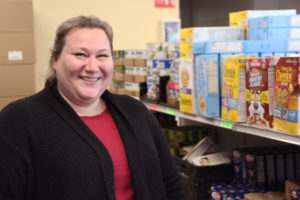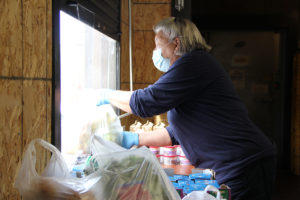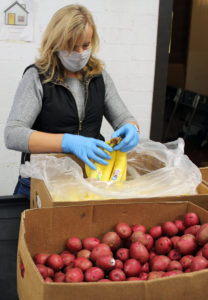Partner Profile: Catholic Charities Food Pantry
Catholic Charities, Diocese of Des Moines has been providing food service to the greater Des Moines community for a long time. Prior to the establishment of Catholic Charities Food Pantry (originally named St. Mary Family Center) in 1993, Catholic Charities operated a food pantry out of a closet in their administrative office.
From their building at 1815 Hubbell Avenue, Catholic Charities Food Pantry provides food to the community in two different ways: a three-day supply of healthy food available every month, as well as additional food items available on a daily basis.
Once per calendar month, pantry visitors can receive a three-day supply of healthy food based on their household size. As Catholic Charities Food Pantry is a member of the DMARC Food Pantry Network, this food is provided to the pantry by DMARC, free of charge.

Leslie Van Der Molen, Catholic Charities Food Pantry
“It goes back to the importance of providing food in a respectful way with dignity, and understanding that just because someone can’t afford food we don’t just expect them to eat what’s handed to them,” said Leslie Van Der Molen, Poverty Reduction Program Manager at Catholic Charities, Diocese of Des Moines.
In addition to the food available on a monthly basis, pantry visitors can receive food on a daily basis as well. Through a window at the front of the building, volunteers distribute pre-packaged food that, depending on the day, can include fresh produce, dairy products, rice, beans, bread, and Meals from the Heartland. Much of this food is obtained through DMARC and Food Bank of Iowa, as well as from local grocery stores through food rescue and recovery. The food available on a daily basis can be feast or famine, depending on what’s coming into the door that day, but freezer capacity does help the food pantry ensure that there’s always something available for those seeking assistance.
 Catholic Charities Food Pantry sees anywhere from 250 to 500 daily visitors receiving food. Beyond providing food, the pantry also distributes infant care items, such as diapers, baby wipes, infant formula, and baby food, personal hygiene items, period supplies, and adult diapers.
Catholic Charities Food Pantry sees anywhere from 250 to 500 daily visitors receiving food. Beyond providing food, the pantry also distributes infant care items, such as diapers, baby wipes, infant formula, and baby food, personal hygiene items, period supplies, and adult diapers.
Van Der Molen credits the success of the food pantry to the dedicated volunteers, staff members, supporters, and organizational partners of Catholic Charities Food Pantry.
“We could not run the pantry the way we run it, with the volume of food that comes through here, without our partnership with DMARC,” said Van Der Molen. “DMARC gives us the ability to do what we do at a low cost. We just absolutely could not do it without being a DMARC partner. I think that’s critical for people to understand just how valuable that partnership is.”
Catholic Charities Food Pantry is one of several programs of Catholic Charities, Diocese of Des Moines. Catholic Charites holds several fundraising events a year to help fund their programs, such as the food pantry. The program also receives support from individual donors, parishes, companies, grants, and food drives. Catholic Charities Food Pantry is one of 14 partner pantries in the DMARC Food Pantry Network, and like all DMARC partner food pantries is also a partner of Food Bank of Iowa, who provides food to the pantry on a regular basis. Additionally, the pantry partners with Eat Greater Des Moines to receive food rescue when available.

“Here in the Midwest, when people are down, we’re always willing to pick somebody up, so I think the response we’ve seen is out of that,” said Van Der Molen. “Hopefully the knowledge around hunger and that it does exist in our community carries on beyond the pandemic.”
Recognizing the reality that hunger and food insecurity exist in our community is key to not only garnering support for organizations providing food assistance, but to address the underlying root causes of food insecurity.
“I think the first thing we have to do as a community is address our misconceptions of poverty,” said Van Der Molen. “When people are able to understand the reality of hunger and food insecurity in our community and that it looks very different than hunger in a third world country – food is readily available, it’s just not nutritious – once we change those misconceptions I think it will be easier as a community to tackle and address the issue. There’s a lot of waste in our community and state. When we live in an agricultural state, there’s no reason anybody should be food insecure.”

